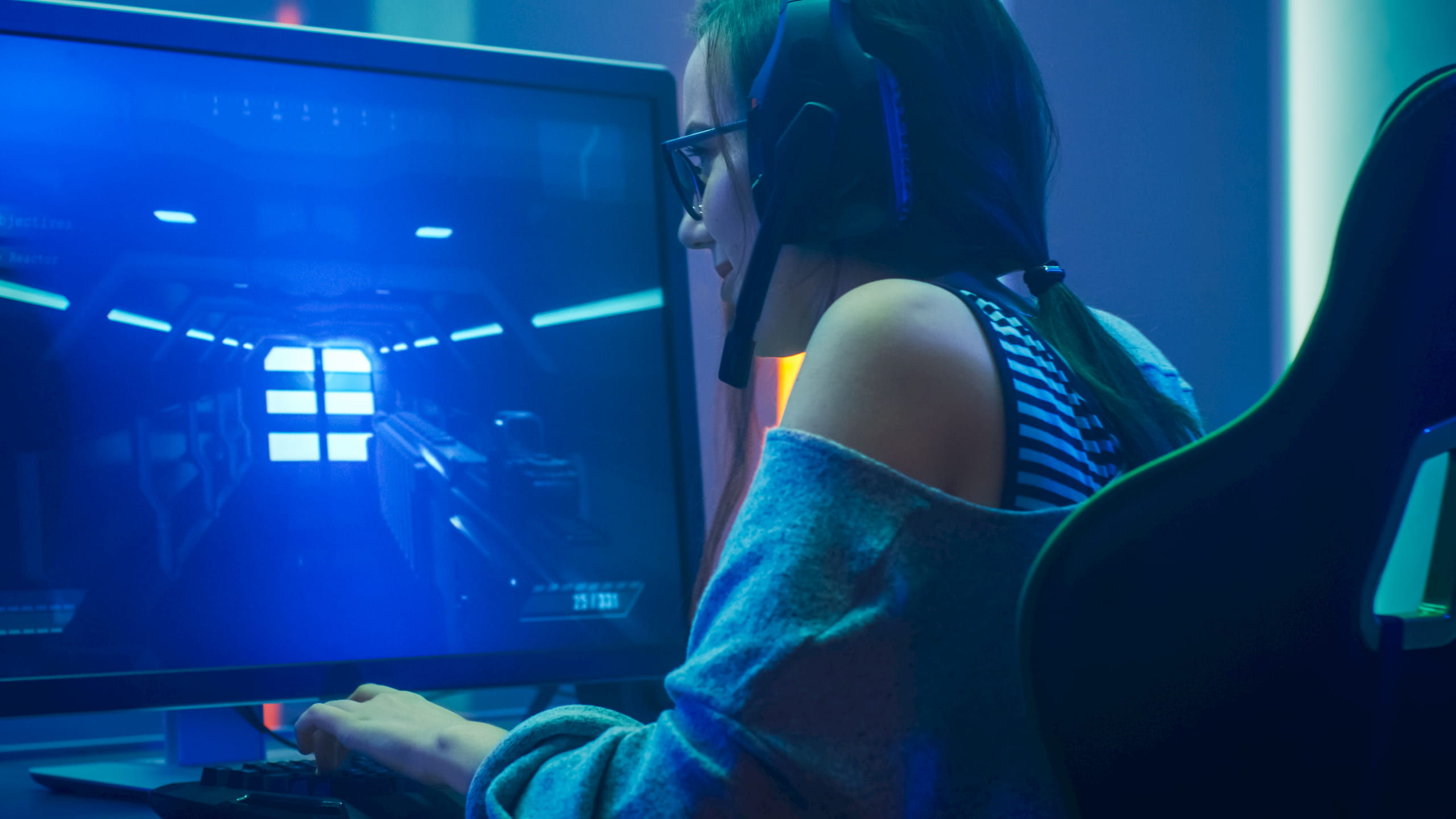Gaming on Satellite Internet
Are online games even possible over satellite?
Feb 4, 2026 | Share
Gaming
If you play online games, you may have fantasized about the perfect gaming setup—huge monitors, lightning-fast CPU, comfy chair—but it’s a safe bet to say that a satellite internet connection isn’t on the list. Satellite internet presents some big challenges to online gaming, though actual download speeds have little to do with it.
If you rely on satellite connections to access the internet, don’t panic; we’re here to walk you through the ins and outs of online gaming over satellite internet.
Best satellite internet for gaming—Starlink
The best satellite internet connection for online gaming is Starlink . Unlike traditional satellite providers that use huge satellites tens of thousands of miles away, Starlink uses low-Earth orbit (LEO) satellites to provide lower latency and (often) faster speeds than the competition. Although there are several other LEO satellite constellations currently being built, Starlink is the only game in town for now.
For more information, check out our in-depth Starlink review.
Data as of 02/04/2026. Offers and availability may vary by location and are subject to change.
* Users on Residential 100 Mbps and Residential 200 Mbps will be limited to download speeds of 100 Mbps and 200 Mbps respectively. Residential 100 Mbps and Residential 200 Mbps plans are only available in select areas. Residential Max users will experience maximum available speeds and top Residential network priority.
 Pros:
Pros:
- Lowest satellite latency
- Fastest satellite download speeds
 Cons:
Cons:
- Higher latency than wired connections
- Long waits for equipment
Compare satellite internet providers
| Provider | Speed | Starting price | Data Caps |
|---|---|---|---|
| Viasat | Up to 150Mbps | $119.99/mo.* | No data cap |
| Hughesnet | Up to 25–100Mbps (stated speeds are not guaranteed) | $39.99/mo.† for first 12 mos. | No data cap |
| Starlink | Up to 100–400Mbps | $50/mo.‡ | No data cap |
Data as of 02/04/2026. Offers and availability may vary by location and are subject to change.
* Prices, speeds and availability vary by location. Prices are subject to change. No annual contract or installation fees are required. Monthly equipment lease fees and taxes may apply.
† Minimum term required and early service termination fees apply. Monthly Fee reflects the applied $5 savings for ACH enrollment. Offer may vary by geographic area.
‡ Users on Residential 100 Mbps and Residential 200 Mbps will be limited to download speeds of 100 Mbps and 200 Mbps respectively. Residential 100 Mbps and Residential 200 Mbps plans are only available in select areas. Residential Max users will experience maximum available speeds and top Residential network priority.
How much speed do I need for gaming?
Although players are no strangers to shelling out thousands of dollars for the fastest computers on the market, you really only need about 3 Mbps of download speed and 1 Mbps of upload speed to play online.1 This goes for both PC and console games. You don’t actually need a ton of internet speed for online games.
“But wait!” you say, “Even the cheapest satellite plans out there offer more speed than that. Why won’t any old satellite plan work for online games?”
Good question. Although playing online games requires less bandwidth than other activities like streaming video, it has very high demands in terms of latency and stability. Unfortunately, these are areas where satellite connections can struggle.
Latency
The biggest challenge for playing games over satellite is minimizing latency. Latency is the time in milliseconds that it takes for a signal to travel from your device to another location (in this case, the game server) and back. It’s sometimes called ping speed because you test your latency by sending “ping” data and calculating how long it takes to come back.
High latency connections cause lag. If your button press reaches the server a fraction of a second later than other players, your controls may be less responsive, or you may be completely disconnected from the game.
Latency can vary a lot, as it relies on things like geographic location. If you’ve ever tried playing on an East Asian from North America, you might notice the difference a few thousand miles can make. When you connect via satellite, take that number and add 44,472 miles to the trip. Most fast action games are unplayable over traditional satellite internet.
This is why LEO satellites like Starlink are such a game changer. Although the trip to low-Earth orbit still adds almost 700 miles to the journey, that’s a big improvement. It still won’t be the greatest connection for playing games, but at least it’s possible.
Reducing latency is also the main idea behind Hughesnet Fusion. Fusion plays reduce latency by making use of terrestrial wireless networks alongside your satellite connection. When playing a game, Hughesnet equipment will switch over to a wireless connection in order to deliver that data to your device without the lag you’d get using your satellite connection.
Stability
Stability is another important factor for having a smooth online gaming experience. A 5 Mbps connection should be plenty of speed, but if you experience fluctuations around 3 Mbps, your speed could dip below the minimum you need to play, causing lag or even a dropped connection.
Wireless connections like satellite can also be impacted by the weather. Aside from power outages, no amount of rain or snow is going to have an effect on a fiber optic cable, but it can interfere with your satellite connection.
To minimize the impact of weather and other interference, it’s a good idea to have a faster connection. You still don’t need a very fast plan just for gaming, but the bigger the buffer you have above your minimum speed, the less likely you are to notice fluctuations.
Hughesnet Fusion also increases the stability of your connection by having a second network to fall back on if it encounters interference.
Downloads and data caps
Another big failing of satellite and other wireless internet connections is data limiting. Although many providers have data caps, even on wired connections, satellite data caps are especially restrictive. This isn’t so much an issue while playing online games, but it can be a big issue if you buy your games from a digital distribution service like Steam.
Pro Tip:
Picking up a physical copy at your local game store can be a great way to avoid huge downloads, but not always. Nowadays digital downloads are so ubiquitous that sometimes the only thing on the game disc is just a script to download the game from Steam anyway.
Downloading a single game can eat up your entire month’s data, so be careful about how you do it. Many satellite providers have programs that give you bonus data in the middle of the night and during off hours that can be used to download and update software. It’s also a good idea to turn off automatic updates so you don’t waste your precious data on software you don’t need to use right away.
For more tips and tricks, check out our guide to budgeting your data.
Are there online games you can play over satellite?
Fast-paced multiplayer games like Fortnite or Call of Duty are not going to play well (if at all) over a traditional satellite connection. If those are the games you want to play, Starlink is really your only option.
Fortunately, there are still a lot of multiplayer games that work with geostationary satellite networks like Viasat and Hughesnet—they just tend to be more turn-based games. This includes classics like the Civilization franchise, but there are lots of other genres that fall into this category.
Board games: Countless board games from chess to Risk have online versions that can be played with very low internet requirements.
Turn-based strategy: Games like Civilization VI and Stellaris are huge, complex, modern games that move at a much more leisurely pace. No one will notice the half-second lag in your internet connection, though they might take issue if you spend five minutes deciding which tech to research next.
Turn-based tactics: If you like challenging your friends in combat, turn-based tactical games like Wargroove and Mordheim: City of the Damned might scratch that itch.
Digital collectable card games: Games like Hearthstone and Magic the Gathering: Arena have pretty intense competitive scenes, but don’t require the lightning-fast reflexes (and connection) of other eSports, making them a much better fit for satellite internet.
Sports games: Although you won’t be playing NBA 2K25 online over a satellite connection anytime soon, many sports, like golf, are naturally turn-based. The internet requirements for sports games vary greatly from game to game, but you can find golf, bowling, and even football video games that are entirely turn-based.
Other rural gaming options
If gaming is a big priority in your choice of internet connection, any other option is preferable to satellite. You’re probably not going to find a good fiber provider that offers service to Highway 40 just past mile marker 9, but at least you might not be completely out of options.
DSL
DSL is one the most widespread wired internet options around, as it’s available almost anywhere that has a phone line. DSL speeds aren’t great, so it’s not an ideal choice for many online activities, but that’s not a huge issue for games. More importantly, DSL latency is only a fraction of satellite internet, which is a big selling point.2
4G LTE home internet
4G LTE home internet uses cellular signals to connect to your home, which makes it available almost anywhere you can get a good cell signal. As a wireless connection, it suffers from many of the same problems as satellite, such as restrictive data caps and some susceptibility to weather conditions, but since it doesn’t have to send your signal to orbit and back, it still experiences much lower latency than satellite.
Fixed wireless
Fixed wireless connections often serve rural towns where the terrain makes it difficult to build communication infrastructure. It can also be found in neighborhoods on the outskirts of larger cities that fall between the gaps of other providers’ networks.
Although the technology itself is similar to 4G LTE and 5G phone networks, fixed wireless towers are usually built with internet service in mind, so they can offer faster or more reliable service.
The bottom line: LEO satellites are a game changer for gaming
There can be a lot of hype around Starlink, but when it comes to online gaming, the hype is real. Satellite still falls short of wired connections, especially in terms of latency and stability, but Starlink and other upcoming LEO satellite providers at least make it possible to play the same games on a satellite connection that you would on cable or DSL.
Hybrid connections like Hughesnet Fusion could fill a similar role, providing low-latency connections that are perfect for online games while using proven technologies that have been around for decades. It remains to be seen which approach will be the most practical option.
Satellite Gaming FAQ
Is satellite internet good for gaming?
Can Viasat handle gaming?
Does Starlink internet work for gaming?
Is Hughesnet internet good for gaming?
Sources
- Nintendo Customer Support, “Issues with Latency While Playing Online (e.g. Characters Jump Around, Slow Response, Lag).” Accessed July 26, 2022.
- Federal Communications Commission, “Seventh Measuring Broadband America Fixed Broadband Report: Appendix F-1,” May 20, 2011. Accessed July 26, 2022.
Author - Peter Christiansen
Peter Christiansen writes about telecom policy, communications infrastructure, satellite internet, and rural connectivity for HighSpeedInternet.com. Peter holds a PhD in communication from the University of Utah and has been working in tech for over 15 years as a computer programmer, game developer, filmmaker, and writer. His writing has been praised by outlets like Wired, Digital Humanities Now, and the New Statesman.
Editor - Rebecca Lee Armstrong
Rebecca Lee Armstrong has more than six years of experience writing about tech and the internet, with a specialty in hands-on testing. She started writing tech product and service reviews while finishing her BFA in creative writing at the University of Evansville and has found her niche writing about home networking, routers, and internet access at HighSpeedInternet.com. Her work has also been featured on Top Ten Reviews, MacSources, Windows Central, Android Central, Best Company, TechnoFAQ, and iMore.




